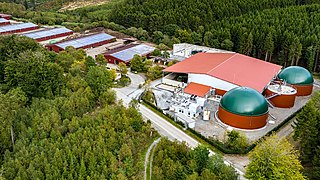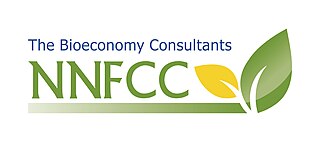Related Research Articles

Biogas is a gaseous renewable energy source produced from raw materials such as agricultural waste, manure, municipal waste, plant material, sewage, green waste, wastewater, and food waste. Biogas is produced by anaerobic digestion with anaerobic organisms or methanogens inside an anaerobic digester, biodigester or a bioreactor. The gas composition is primarily methane and carbon dioxide and may have small amounts of hydrogen sulfide, moisture and siloxanes. The methane can be combusted or oxidized with oxygen. This energy release allows biogas to be used as a fuel; it can be used in fuel cells and for heating purpose, such as in cooking. It can also be used in a gas engine to convert the energy in the gas into electricity and heat.
Alternative technology is a term used to refer to technologies that are more environmentally friendly than the functionally equivalent technologies dominant in current practice. The term was coined by Peter Harper, one of the founders of the Centre for Alternative Technology, North Wales, in Undercurrents (magazine) in the 1970s. Alternative Technologies are created to be safer, cleaner, and overall more efficient. The goals of alternative technology are to decrease demand for critical elements by ensuring a secure supply of technology that is environmentally friendly, increased efficiency with lower costs, and with more common materials to avoid potential future materials crises. Alternative technologies use renewable energy sources such as solar power and wind energy. Some alternative technologies have in the past or may in the future become widely adopted, after which they might no longer be considered "alternative." For example, the use of wind turbines to produce electricity.

Anaerobic digestion is a sequence of processes by which microorganisms break down biodegradable material in the absence of oxygen. The process is used for industrial or domestic purposes to manage waste or to produce fuels. Much of the fermentation used industrially to produce food and drink products, as well as home fermentation, uses anaerobic digestion.

Bioenergy is a type of renewable energy that is derived from plants and animal waste. The biomass that is used as input materials consists of recently living organisms, mainly plants. Thus, fossil fuels are not regarded as biomass under this definition. Types of biomass commonly used for bioenergy include wood, food crops such as corn, energy crops and waste from forests, yards, or farms.

Renewi plc is a leading European waste management company operating primarily in the Benelux region. It is listed on the London Stock Exchange and Euronext Amsterdam and is a constituent of the FTSE 250 Index.
Renewable natural gas (RNG), also known as biomethane, is a renewable fuel and biogas which has been upgraded to a quality similar to fossil natural gas and has a methane concentration of 90% or greater. By removing CO2 and other impurities from biogas, and increasing the concentration of methane to a level similar to fossil natural gas, it becomes possible to distribute RNG via existing gas pipeline infrastructure. RNG can be used in existing appliances, including vehicles with natural gas burning engines (natural gas vehicles).
A mechanical biological treatment (MBT) system is a type of waste processing facility that combines a sorting facility with a form of biological treatment such as composting or anaerobic digestion. MBT plants are designed to process mixed household waste as well as commercial and industrial wastes.

Biodegradable waste includes any organic matter in waste which can be broken down into carbon dioxide, water, methane, compost, humus, and simple organic molecules by micro-organisms and other living things by composting, aerobic digestion, anaerobic digestion or similar processes. It mainly includes kitchen waste, ash, soil, dung and other plant matter. In waste management, it also includes some inorganic materials which can be decomposed by bacteria. Such materials include gypsum and its products such as plasterboard and other simple sulfates which can be decomposed by sulfate reducing bacteria to yield hydrogen sulfide in anaerobic land-fill conditions.
The New Technologies Demonstrator Programme is a scheme part of Defra's Waste Implementation Programme, New Technologies Workstream, to demonstrate advanced solid waste processing technologies in England. A pot of £30million was allocated to fund 10 demonstrator projects with the project being headed by Dave Brooks at Defra. The scheme is not on schedule for the ambitious targets that were initially set out by Defra, however 9 projects out of the initial 10 are now projected to be operational by April 2009, over 2 years behind schedule.

Food waste in the United Kingdom is a subject of environmental, and socioeconomic concern that has received widespread media coverage and been met with varying responses from government. Since 1915, food waste has been identified as a considerable problem and has been the subject of ongoing media attention, intensifying with the launch of the "Love Food, Hate Waste" campaign in 2007. Food waste has been discussed in newspaper articles, news reports and television programmes, which have increased awareness of it as a public issue. To tackle waste issues, encompassing food waste, the government-funded "Waste & Resources Action Programme" (WRAP) was created in 2000.

Blue Marble Biomaterials, founded in 2007, is a US-based company which utilizes hybridized bacteria to produce specialty biochemicals and renewable biogas. The company develops and generates these biochemicals using non-virgin cellulose as biomass.
The Queen's Award for Enterprise: Innovation (Technology) (2006) was awarded on 21 April 2006, by Queen Elizabeth II.
The Queen's Award for Enterprise: International Trade (Export) (2005) was awarded on 21 April 2005, by Queen Elizabeth II.

The Association for Renewable Energy and Clean Technology, previously known as Renewable Energy Association (REA), is a renewable energy and clean technology trade association in the UK encompassing all of renewables industry in the United Kingdom. REA covers renewable power & flexibility, heat and cooling, circular bioresources and transport. The REA is a not-for-profit company.

NNFCC is a consultancy company specialising in bioenergy, biofuels and bio-based products.

Harvest Power, Inc. was a privately held organics management company headquartered in Waltham, Massachusetts, United States that specializes in converting food waste and yard waste into biofuel, compost, mulch and fertilizer. In 2014 Fast Company named it one of the most innovative companies in the world. In August of 2020 Harvest Power Orlando ceased operations for unknown reasons and all assets were put up for sale; the company was dissolved in April 2021.
London Sustainable Industries Park (LSIP) is a 60 acre eco-industrial park in the Dagenham Dock area of the London Borough of Barking and Dagenham in London, England. Around half the plots are taken up by whole businesses and the remaining half have been sold to Segro to be divided up into spaces for smaller businesses, marketed as Segro Park Dagenham.
Prosper De Mulder Group, commonly known as PDM Group, was a British group of companies that operated in a number of fields associated with the food chain. It was acquired by the German-based SARIA Group and the name was changed to SARIA in 2014. The company provided services to the agricultural and food sectors, as a producer of green forms of energy, and as a manufacturer of products for human consumption, pet food, aquaculture, oleochemistry and agriculture.
Himark Biogas Inc. is a waste-to-energy technology and engineering services company. Himark's provides services such as licensing of patented anaerobic digestion technology, conducting feasibility studies, carrying out project design, providing support on engineering and construction, commissioning, and rescue and resuscitation of digesters.
Hitachi Zosen Inova (HZI) is a Swiss company specialising in energy from waste (EfW). It is a subsidiary of the Japanese Hitachi Zosen Corporation since its acquisition in 2010 from A-TEC Industries.
References
- ↑ "Royal approval for Bedfordshire anaerobic digester". LetsRecycle.com. 13 September 2007.
- ↑ "Biogen acquires Greenfinch engineering company". Farmer's Weekly. 30 October 2008.
- ↑ "Kier invests £24m in renewables JV". The Construction Index. 2 August 2012.[]
- ↑ "Ancala Bioenergy acquires Biogen". 16 November 2023.
- ↑ http://www.biogen.co.uk/The-Biogen-Difference/Our-Industry-Experience Archived 2016-02-01 at the Wayback Machine Biogen website
- ↑ "Biogen opens first Hertfordshire's food waste to green energy plant". CIWM Journal Online. 6 February 2015. Archived from the original on 19 July 2015.
- ↑ "Biogen acquires Weston-super-Mare AD site". www.letsrecycle.com. 11 November 2019. Retrieved 2020-01-29.
- ↑ "Green light for Northamptonshire AD plant". LetsRecycle.com. 14 May 2008.
- ↑ "Biogen starts work on Warwickshire AD". LetsRecycle.com. 15 May 2013.
- ↑ "Waen AD food waste plant to start generating power by summer". BBC News. 24 March 2014.
- ↑ "Work starts on £5m food waste power plant near Caernarfon". Daily Post. 25 October 2012.
- ↑ "Biogen starts work on third food waste to energy plant in Wales". Waste Management World. 11 December 2013.
- ↑ "Biogen expands with Scottish AD acquisition".